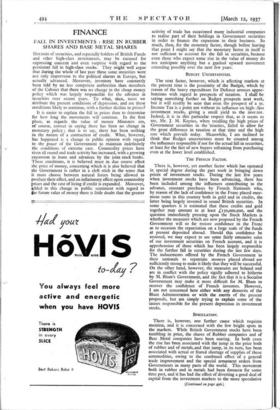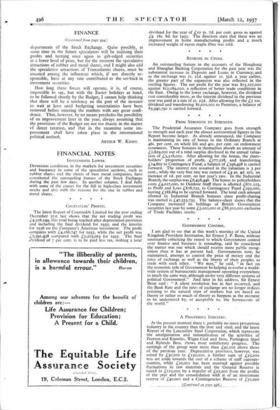FALL IN INVESTMENTS : RISE IN RUBBER SHARES AND BASE
METAL SHARES
FINANCE
HOLDERS of securities, and especially holders of British Funds and other high-class investments, may be excused for expressing concern and even surprise with regard to the persistent fall in high-class stocks. They might well argue that during the whole of last year these same securities were not only impervious to the political alarms in Europe, but actually advanced. Moreover, investors have constantly been told by no less competent authorities than members of the Cabinet that there was no change in the cheap money policy which was largely responsible for the advance in securities over recent years. To what, then, must we attribute the present conditions of depression, and are these conditions likely to continue, with a further decline in prices?
It is easier to explain the fall in prices than to determine for how long the movements will continue. In the first place, as regards the value of money Ministers are, of course, correct in saying there has been no change in monetary policy; that is to say, there has been nothing in the nature of a contraction of credit. What, however, has happened is a change in public opinion with regard to the power of the Government to maintain indefinitely the conditions of extreme ease. Commodity prices have risen all round and trade activity has increased, with a growing expansion in loans and advances by the joint stock banks. These conditions, it is believed must in due course affect the price of money, concerning which it is also believed that the Government is rather in a cleft stick in the sense that it must choose between natural forces being allowed to produce their effect, and an inflationary effect upon commodity prices and the cost of living if credit is expanded. Moreover, added to this change in public sentiment with regard to die future value of money there is little doubt that the greater activity of trade has occasioned many industrial companies to realise part of their holdings in Government securities in order to, finance the expansion in their business. ' So much, then, for the monetary factor, though before leaving that point I might say that the monetary factor in itself is not sufficient to account for the fall in securities, because even those who expect some rise in the value of money do not anticipate anything but a gradual upward movement extending possibly over the next few years.
BUDGET UNCERTAINTIES.
The next factor, however, which is affecting markets at the present time is the proximity of the Budget, which by reason of the heavy expenditure for Defence arouses appre- hensions with regard to prospects of taxation. I shall be saying something further on Budget prospects next week, but it will readily be seen that even the prospect of a 5s. Income Tax is a point not without its influence on high-_lass investment stocks, giving a small yield to the inve3tor. Indeed, it is in this particular respect that, as it seems to me, Mr. J. M. Keynes, when recalling the high prices of Government securities in the 'nineties, failed to allow for the great difference in taxation at that time and the high rate which prevails today. Meanwhile, I am inclined to think that Budget uncertainties must be counted among the influences responsible if not for the actual fall in securities, at least for the fact of new buyers refraining from purchasing even at the lower level established.
THE FRENCH FACTOR.
There is, however, yet another factor which has operated in special degree during the past week in bringing down prices of investment stocks. During the last few years when investment stocks have been advancing, there has been included among the influences contributing to the advance, constant purchases by French Nationals who, by reason of the lack of confidence in the Franc placed enor- mous sums in this country both in gold and in credits, the latter being largely invested in sound British securities. In some quarters it is estimated that these credits and gold together may amount to at least £150,000,000, and the question immediately pressing upon the Stock Markets is whether the measures which are now proposed by the French Government will so far restore confidence in the Franc as to occasion the repatriation on a large scale of the funds at present deposited abroad. Should this confidence be restored, we may expect to see some fairly extensive sales of our investment securities on French account, and it is apprehension of these which has been largely responsible for the further fall in securities during the last few days. The inducements offered by the French Government to their nationals to repatriate moneys placed abroad are sufficiently strong to make it likely that they will be successful. On the other hand, however, the measures are belated and are in conflict with the policy rigidly adhered to hitherto by M. Blum's Government, and the fact that it is a Socialist Government may make it more difficult for M. Blum to recover the confidence of French investors. However, I am not concerned here either with any demerits of the Blum Administration or with the merits of the present proposals, but am simply trying to explain some of the causes responsible for the present depression in investment stocks.
SPECULAI1ON.
There is, however, one further cause which requires mention, and it is concerned with the few bright spots in the markets. While British Government stocks have been tumbling in price, the shares of Rubber companies and of Base Metal companies have been soaring. In both cases the rise has been associated with the jump in the price both of rubber and of metals, and that jump, in its turn, has been associated with actual or feared shortage of supplies of these commodities, owing to the combined effect of a general trade improvement and the special armament orders from Governments in many parts of the world. This movement both in rubber and in metals had been foreseen for some time past, and it has had the effect of diverting a good deal of capital from the investment markets to the more speculative (Continued on page 496.)
FINANCE
(Continued from page 494-) departments of the Stock Exchange. Quite possibly, at some time in the future speculators will be realising their profits and turning once again to gilt-edged securities at a lower level of price, but for the moment the speculative attractions of rubber and metal shares, and I might also add the speculative attractions of Transatlantic shares, must be counted among the influences which, if not directly re- sponsible, have at any rate contributed to the set-back in investment securities.
How long these forces will operate, it is, of course, impossible to say, but with the Easter holidays at hand, to be followed shortly by the Budget, I cannot help thinking that there will be a tendency on the part of the investor to wait at least until budgeting uncertainties have been removed before entering the markets with any great confi- dence. That, however, by no means precludes the possibility of an improvement later in the year, always assuming that the provisions of the Budget are not too drastic in the matter of direct taxation, and that in the meantime some im- provement shall have taken place in the international political outlook.
ARTHUR W. KIDDY.















































 Previous page
Previous page